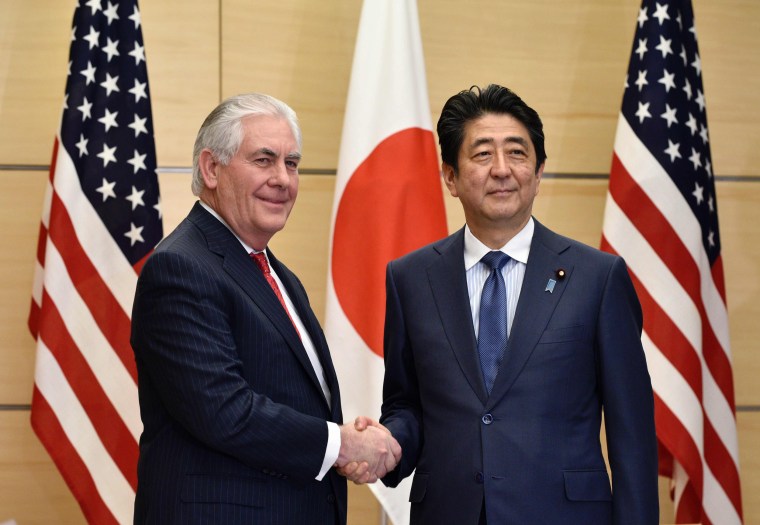TOKYO — Secretary of State Rex Tillerson issued a blistering attack on two decades of bipartisan attempts to deter North Korea's nuclear program, saying the Trump administration will have a new approach.
“The diplomatic and other efforts of the past 20 years to bring North Korea to a point of de-nuclearization have failed. So we have 20 years of failed approach,” Donald Trump's top diplomat said during a visit to Japan on Thursday. "And that includes a period in which the U.S. provided $1.35 billion in assistance to North Korea as an encouragement to take a different pathway."
Tillerson was speaking at a joint press conference with Japanese counterpart Fumio Kishida in Tokyo after the two discussed how to deal with the growing threat from Pyongyang. North Korea has conducted two nuclear tests and 24 ballistic missile tests in just the last year, including four last week that landed in the sea off Japan.
Tillerson, who also met with Japanese Prime Minister Shinzo Abe, added that North Korea had responded to “encouragement” to abandon its weapons program by developing its nuclear capability and conducting more launches.
“In the face of this ever escalating threat, it is clear that a different approach is required,” he said.
The secretary of state also called on Pyongyang to abandon its nuclear and ballistic missile programs, saying it had "has nothing to fear" from the United States.
Washington has been urging Japan and South Korea — both of which host tens of thousands of U.S. troops — to step security cooperation despite their historically strained relations. This week, the nations' three navies conducted missile defense information-sharing drills in the region.
Kim Jong Un's regime has repeatedly threatened to test-fire an intercontinental ballistic missile (ICBM).
While North Korea regularly threatens nuclear attacks against the United States, until last year analysts had thought the country was a long way from developing missile technology that would make them capable of doing so.
Shortly before Tillerson made his comments in Tokyo, a senior North Korean diplomat in Beijing addressed its nuclear program and relations with the U.S. during a rare press conference.
North Korea's Charge d'Affaires Pak Myong Ho told journalists that his country needed to strengthen its nuclear capabilities against an "aggressive" America "given threats from U.S. and relevant countries."
Pak also said his country had proposed a peace deal that the U.S. rejected, and added that the America was carrying out the largest-ever military drills off its waters.

